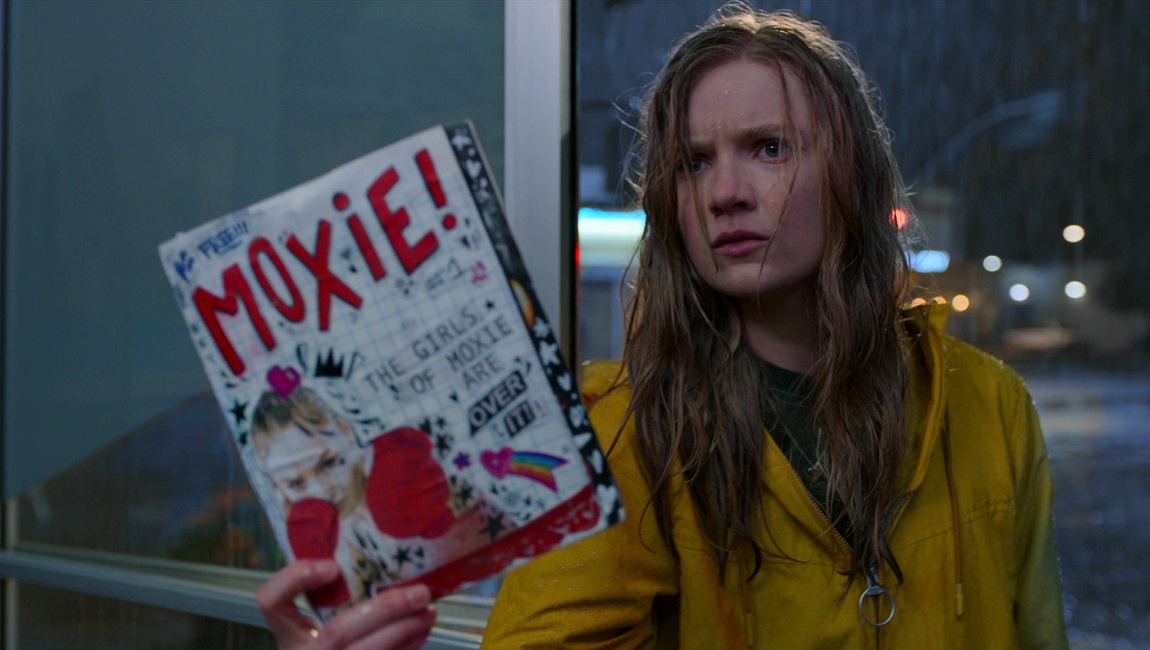Moxie boasts a surprisingly lush visual design, but its soft script and weak character development leaves a lot to be desired.
Adapted from Jennifer Mathieu’s 2017 novel of the same name, Amy Poehler’s Moxie will likely give rise to a tumult of mixed feelings for many viewers. The immediate question that springs to mind when watching this two-hour high school drama is why Netflix, given the current film and television landscape, didn’t produce the project in mini-series format? It’s a question of importance, because if there’s anything from which Moxie most gravely suffers, it can be found in its undercooked subplots and one-dimensional characters and dramas, beats that could have been elongated and deepened in long-form format. Consider an early example of this hurried development: 20 minutes into the film, Vivian (Hadley Robinson) asks her ex-riot grrrl single mom, Lisa (played by Poehler herself), “Hey mom, what do 16-year-olds care about?”, to which her mother humorlessly replies, “I don’t know. When I was 16, all I cared about was smashing the patriarchy.” Vivian then storms to her room, with the idea to publish an “underground” feminist high school zine — no matter that we don’t really get much of a sense of what its content actually is. It all feels like it’s on fast-forward, as the screenwriting duo of Tamara Chestna and Dylan Meyer don’t carve out the time to lay a reliable foundation for the plot to build and for character motivation to develop — and it results in Vivian coming off more like an edgelord than a bright-minded, inspirational young woman.
Predictably, it’s all much safer than its plot would suggest, and somewhat less humorous than it needed to be, and the way that it tackles a litany of issues, from sexism to bullying to racial discrimination, borders on shallow, sentimental cliché and profound mediocrity. Oddly, as the “go get ‘em girl” narrative fails to deliver on much of its promise, it’s the film’s gauzy trappings that instead prove most successful: Tom Magill’s cinematography is full of vibrant color, and the meticulous production design and set decorations shape a bewitching, even beguiling atmosphere that casually immerses the viewer. Indeed, it’s enough to punctuate the screen presence of the entire cast of young actors — none more so than delightful newcomer, Robinson — and give their feelings vivid space to flourish. It’s all further enlivened as the energetic rock soundtrack kicks in, at least somewhat compensatory for the script’s deficiencies and numerous underwhelming pep talks; little is asked of the adult characters, with the performers delivering a little face time in accessory roles.
What keeps Moxie mostly heartwarming and relatable despite its flaws, however, is that Poehler and co. never take the work too seriously, even if they do cherry-pick a number of serious leitmotifs from better works. Instead, they try to keep it of a piece with the familiar, if generic, spirit of the teen movie lineage — kind of a high floor, low ceiling proposition. But just as the film’s rhythm has begun to settle and engage, the heavy-handed, ostensible climax arrives, and Moxie again loses its ways. Addressing up the very heavy issue of rape, this development feels at odds with the prevailing lighthearted context and mood with which the film has heretofore been presented; executed better, that contrast could arguably have been the point, but it’s mishandled here. And it gets worse: next comes a “ra-ra” scene in which students defend each other by stating, “Expel me!” It’s a sequence with shades of the “#metoo” movement and clearly intended to be executed to exhilarating “I’m Spartacus!” effect, but one which, like much else here, is ultimately too mawkish. Given this instinct toward big moments, when Poehler’s character suddenly steps into frame out of absolutely nowhere, her satisfied smile set to the youngsters’ cheering, it’s tough to feel that she isn’t just patting herself on the back (it seems likely this moment was intended to be a celebration of the film’s resistance to a heritage of reductive messaging that’s supposed to be handed from mothers to their daughters, but that’s never really felt). If there’s a simple lesson that the film would have done well to follow, it’s that actions speak louder than words; Moxie should have been more vigorous with developing its characters and more exacting in crafting nuanced story rather than artlessly yelling its thoughts at viewers’ faces. Ultimately, it’s the difference between something like cult classic Rock ‘n’ Roll High School and any number of disposable, good-hearted but shallow products like Moxie. If there’s a lesson on the film’s mind, it’s that normal doesn’t necessarily mean good or right, and that’s something we should all be able to agree upon, both in cinema and cultural discourse. Despite its would-be rock ‘n roll spirit, then, Moxie is…normal.







